Tech, Media & Telecom
S.Korea to prop up quantum tech with academia, private sector
The country will open its 2nd graduate school for quantum technology, flagged as a national future strategic technology, with KAIST
By May 10, 2023 (Gmt+09:00)
4
Min read
Most Read
LG Chem to sell water filter business to Glenwood PE for $692 million


KT&G eyes overseas M&A after rejecting activist fund's offer


Kyobo Life poised to buy Japan’s SBI Group-owned savings bank


StockX in merger talks with Naver’s online reseller Kream


Meritz backs half of ex-manager’s $210 mn hedge fund


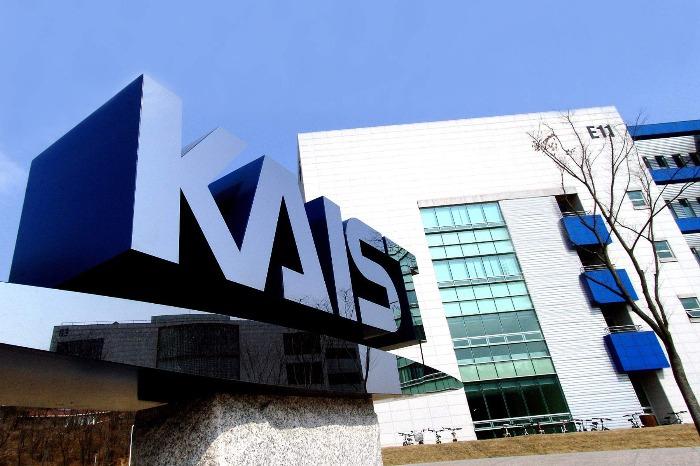
South Korea, trailing in the global race for quantum technology, will open a new quantum technology-dedicated graduate school with a consortium led by the country’s leading science research university the Korea Advanced Institute of Science and Technology (KAIST).
The announcement has come after Korea’s Ministry of Science and ICT on Wednesday agreed with major Korean conglomerates, universities and research institutes to take a quantum leap in the development of quantum technology, often heralded as the next game changer for future industries, especially in future warfare.
Betting on quantum technology to bring unprecedented global change, many countries, from the world’s two biggest economies the US and China to European countries and Japan, have rushed to make massive investments in the technology.
Reflecting global enthusiasm for quantum technology, McKinsey & Company projected the global quantum technology market to expand to 101 trillion won ($76.2 billion) in 2030 from 8.6 trillion won in 2022. It also forecast in its latest Quantum Technology Monitor paper published in April that the market would further grow to $106 billion by 2040.
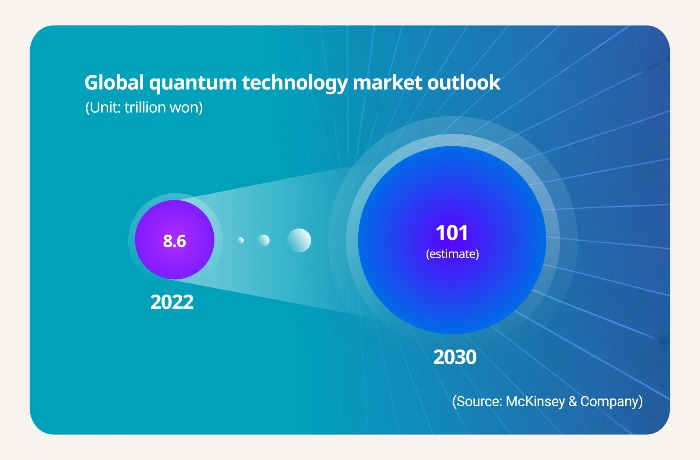
“It is time to catch up with the countries that are sprinting to take the lead in quantum technology development,” Lee Jong-ho, Korean science minister, said on Wednesday.
The Korean government has pledged bold investments in quantum technology, designated as one of its key national strategic future technologies.
In line with efforts to meet the goal, Seoul in April agreed with Washington to cooperate on the development of quantum technology during Korean President Yoon Suk Yeol’s state visit to the US.
The latest measures announced by the Ministry of Science and ICT on Wednesday are follow-up actions to reinforce the two nations’ quantum technology alliance.
PARTNERSHIPS WITH ACADEMIA, CONGLOMERATES
As part of the follow-up measures, a KAIST-led consortium will open a new research university in Korea to produce 180 doctoral students that can lead quantum technology development with government aid of 24.2 billion won over the next nine years.
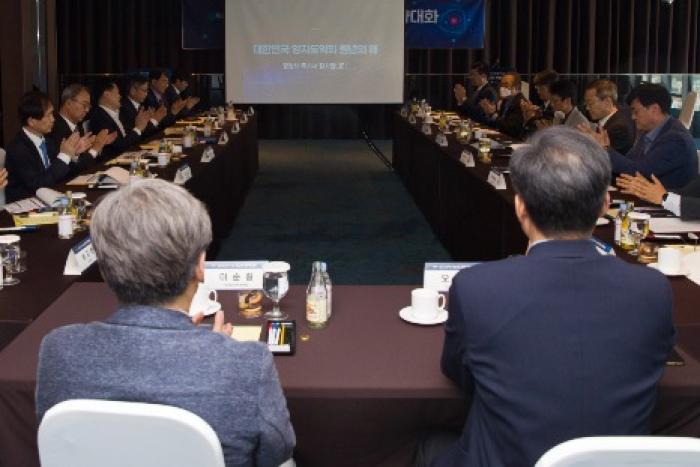
Korea’s top five conglomerates Samsung, SK, Hyundai Motor, LG and POSCO also agreed to join the project to set up the country’s second quantum technology-dedicated graduate school after the one chosen last year to be opened by the Korea University-led consortium.
LG’s R&D hub LG Sciencepark, Samsung Display Co. and LIG Nex1 Co. will team up to run internship programs with the new quantum technology graduate school.
The government will provide at least 40 billion won in financial aid to foster quantum technology startups and come up with a new law for the country’s quantum technology industry.
GAME CHANGER IN FUTURE WARFARE
Quantum technology encompasses quantum computing, quantum communications and quantum sensing technologies.
Many countries pin high hopes on this promising technology, expected to create breakthroughs across all industries.
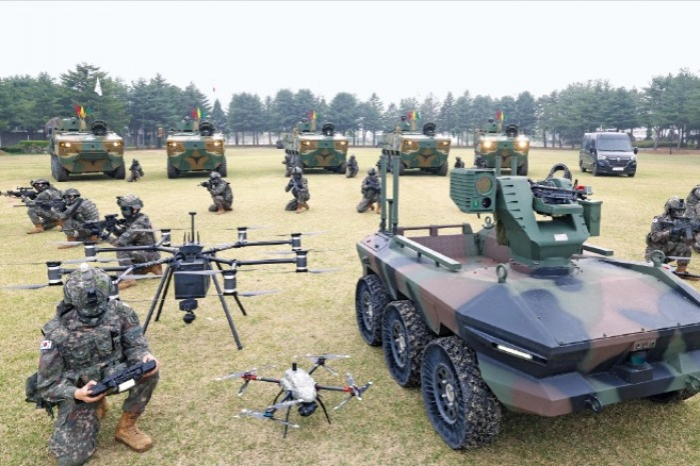
In particular, it is expected to play a more critical role in South Korea, which is technically still at war with North Korea since the Korean War ended in 1953 with an armistice agreement signed by North Korea, China and the US-led United Nations Command for a ceasefire.
Quantum technology is considered useful in developing technologies that can detect super-sonic stealth jets, completely block wiretapping or hacking and extend the voyage of a submarine that can launch ballistic missiles.
The Electronics and Telecommunications Research Institute (ETRI), Korea’s state-funded research institution, has recently developed quantum cryptography technology using less than 1 kilobyte (kb), which can be used by the South Korean military to decode data stored in a drone.
It will be impossible for the North Korean army to decrypt the encrypted data without the South’s original quantum secret codes even if it intercepts the drone, said Ju Jung-jin, the head of ETRI’s quantum technology research.
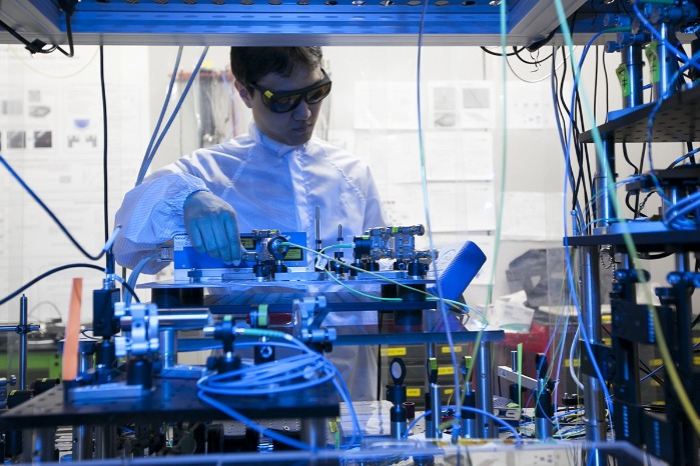
QUANTUM SENSING & QUANTUM COMPUTING
ETRI and Korea’s other state-funded research institutes have been working with the country’s private sector to expand the application of quantum technology in the defense sector.
Especially, expectations are high that quantum sensing technology could play a vital role in protecting South Korea from North Korea’s nuclear threats.
Of quantum sensing technologies, the quantum magnetometer should be useful in detecting North Korea’s nuclear-capable unmanned underwater attack weapons, dubbed Haeil, as quantum sensors are more sensitive than classical sensing technology.
Quantum squeezing technology-powered radars can identify stealth jets. Even the F-35 Lightning II, considered the world’s best stealth fight jet, could not avoid this quantum sensing detection with a 95% detection rate in recent tests.
Quantum computing is also actively explored as its big-size data processing should be much faster than the current computing technology. Combined with artificial intelligence technology, it will exponentially improve the computation of probability.
It is also a useful tool in decoding military secret codes.
Write to Hae-Sung Lee and Jin-Won Kim at ihs@hankyung.com
Sookyung Seo edited this article.
More to Read
-
 Tech, Media & TelecomSK Telecom expands business portfolio with quantum tech
Tech, Media & TelecomSK Telecom expands business portfolio with quantum techSep 20, 2022 (Gmt+09:00)
3 Min read -
 Cloud computingSamsung SDS to collaborate with NIST in post-quantum cryptography
Cloud computingSamsung SDS to collaborate with NIST in post-quantum cryptographyAug 25, 2022 (Gmt+09:00)
1 Min read -
 Tech, Media & TelecomSK Broadband applies quantum cryptography to Korea network
Tech, Media & TelecomSK Broadband applies quantum cryptography to Korea networkJun 09, 2022 (Gmt+09:00)
1 Min read -
 Future mobilityHyundai Motor expands partnership with quantum computing firm IonQ
Future mobilityHyundai Motor expands partnership with quantum computing firm IonQApr 20, 2022 (Gmt+09:00)
3 Min read -
 Quantum computingKorean telecom firms expand commercial use of quantum cryptography
Quantum computingKorean telecom firms expand commercial use of quantum cryptographyJun 09, 2021 (Gmt+09:00)
5 Min read
Comment 0
LOG IN


